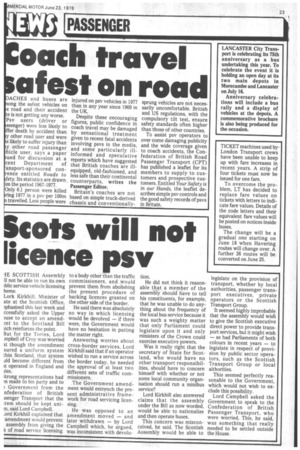cots will not licence psv
Page 25

If you've noticed an error in this article please click here to report it so we can fix it.
iE SCOTTISH Assembly 11 not be able to run its own tblic service vehicle licensing heme.
Lork Kirkhill, Minister of ate at the Scottish Office, Thasised this last week and ccessfully asked the Upper use to accept an amendnit to the Scotland Bill dch reinforces the point.
But for the Tories, Lord mpbell of Croy was worried it though the amendment sured a uniform system thin Scotland, that system aid become different from Lt operated in England and des.
;trong representations had al made to his party and to Government from the nfederation of British isenger Transport that the tern should be kept unina, said Lord Campbell.
,ord Kirkhill explained that amendment would prevent assembly from giving the k of road service licensing to a body other than the traffic commissioners, and would prevent them from abolishing the present procedure of backing licences granted on the other side of the border.
He said there was absolutely no way in which licensing would be devolved — if there were, the Government would have no hesitation in putting the matter right.
Answering worries about cross-border services, Lord Kirkhill said that if an operator wished to run a service across the border today, he needed the approval of at least two different sets of traffic commissioners..
The Government amendment would entrench the present administrative framework for road servicing licensing.
He was opposed to an amendment moved — and later withdrawn — by Lord Campbell which, he argued, was inconsistent with devolu tion.
He did not think it reasonable that a member of the assembly -should have to tell his constituents, for example, that he was unable to do anything about the frequency of the local bus service because it was such a weighty matter that only Parliament could legislate upon it and only ministers of the Crown could exercise executive powers.
Was it really right that the secretary of State for Scotland, who would have no other transport responsibilities, should have to concern himself with whether or not some local community organisation should run a minibus service?
Lord Kirkhill also answered claims that the assembly under the Bill as now worded, would be able to nationalise and then operate buses.
This concern was misconceived, he said. The Scottish Assembly would be able to legislate on the provision of transport, whether by local authorities, passenger transport executives, private operators or the Scottish Transport Group.
It seemed highly improbable that the assembly would wish to give the Scottish executive direct power to provide transport services, but it might wish — as had Parliaments of both colours in recent years — to legislate in respect of provi sion by public sector operators, such as the Scottish Transport Group or local aithorities.
This seemed perfectly reasonable to the Government, which would not wish to exclude this possibility.
Lord Campbell asked the Government to speak to the Confederation of British Passenger Transport, who were worried. This, he said, was something that really needed to be settled outside the House.




































































































































































